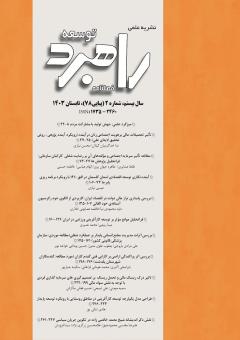بررسی اثرات مدیریت منابع انسانی پایدار بر عملکرد شغلی(مطالعه موردی: سازمان پزشکی قانونی کشور
محورهای موضوعی :علی مرادی باروجی 1 , یعقوب علوی متین 2 , حسین بوداقی خواجه نوبر 3
1 - دانشجوی دکتری مدیریت صنعتی، دانشگاه آزاد اسلامی ،واحد تبریز، گروه مدیریت، تبریز، ایران
2 - دانشگاه آزاد اسلامی تبریز
3 - دانشگاه آزاد اسلامی واحد تبریز
کلید واژه: واژگان کلیدی: منابع انسانی پایدار, عملکرد شغلی, مشارکت, آموزش, توانمندسازی کارکنان,
چکیده مقاله :
اهداف: سازمانها، برای دستیابی به اهداف مناسب خود از شیوههای مختلف مدیریت منابع انسانی استفاده میکنند. مدیریت دقیق منابع انسانی در یک سازمان، مواردی ازجمله ایجاد محیط دوستانه، قدردانی از عملکرد، ارائه بازخورد برای کارکنان، و ... عملکرد کلی سازمان را تضمین میکند. در این مطالعه به بررسی اثرات مدیریت منابع انسانی پایدار بر عملکرد شغلی در سازمان پزشکی قانونی کشور پرداخته شده است. ابزار و روش¬ها: تحقیق حاضر از لحاظ هدف، کاربردی- توسعه¬ای و از نظر روش انجام تحقیق، از نوع توصیفی و مدل¬سازی بوده است. جامعه آماری در این تحقیق، کلیه 2800 نفر از کارکنان مشغول به کار در 31 اداره کل پزشکی قانونی با احتساب تعداد 31 استان بود. ابزار اصلی اندازه¬گیری در این تحقیق پرسشنامه بود برای آزمون فرضیات تحقیق از مدلسازی معادلات ساختاری بهره گرفته شد. یافته¬ها: نتایج نشان داد. انتخاب کارکنان بر عملکرد شغلی کارکنان و آموزش کارکنان سازمان پزشکی قانونی کشور تأثیر دارد. مشارکت کارکنان بر عملکرد شغلی کارکنان سازمان پزشکی قانونی کشور تأثیر دارد. توانمندسازی کارکنان بر آموزش کارکنان سازمان پزشکی قانونی کشور تأثیر دارد و در نهایت آموزش کارکنان بر عملکرد شغلی کارکنان سازمان پزشکی قانونی کشور تأثیر دارد. نتیجه¬گیری: مدیریت منابع انسانی پایدار، به دنبال ایجاد تعادل بین ابعاد اقتصادی، اجتماعی و زیست محیطی در سازمان است که می¬تواند باعث افزایش عملکرد فردی و در نهایت عملکرد سازمانی شود.
Ali Moradi Baroji Yaghoub Alavi Matin Hossein Bodaghi Khajeh Noubar Abstract Objectives: Organizations use different methods of human resource management to achieve their goals. Careful management of human resources in an organization ensures things like creating a friendly environment, appreciating performance, providing feedback to employees, and so on. In this study, the effects of sustainable human resource management on job performance in the country's forensic medicine organization have been investigated. Methods: The present research was applied-developmental in terms of purpose and descriptive and modeling in terms of research method. The statistical population in this study was all 2800 employees working in 31 general forensic departments, including 31 provinces. The main measurement tool in this study was a questionnaire that was distributed among the sample members after confirming its validity and reliability. Structural equation modeling was used to test the research hypotheses. Findings: The results showed. The selection of employees affects the job performance of employees and the training of employees of the country's forensic medicine organization. Employee participation affects the job performance of employees of the country's forensic medicine organization. Employee empowerment affects the training of employees of the country's forensic medicine organization, and finally, staff training affects the job performance of employees of the country's forensic medicine organization. Conclusion: Sustainable human resource management seeks to balance the economic, social and environmental dimensions of the organization, which can increase individual performance and ultimately organizational performance.
